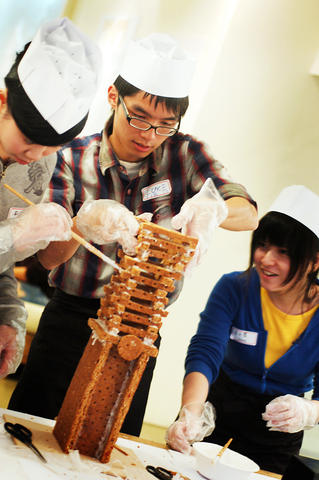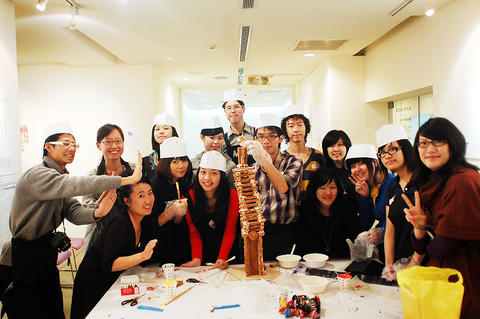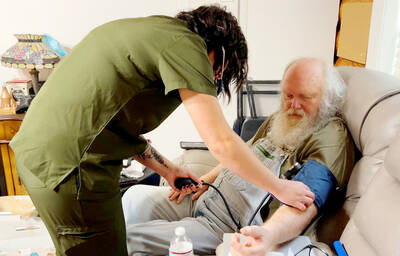Gingerbread nativity scenes are a staple of store windows come Christmas, but under the guiding hand of Post Theater, a multinational group of young artists who want to take theater, well, beyond theater, gingerbread has been transformed into the basis for a dialog about monumental structures and architectural symbols of identity. Of course, it also aims to provide some fun in the run-up to Christmas.
Monumental X'mas is the name of an event jointly organized by the German Cultural Center and the Taipei Artist Village (台北國際藝術村), who have invited the Berlin-based group Post Theater, made up of Max Schumacher and Hiroko Tanahashi, to lead a number of workshops to build Taiwanese and German monuments out of gingerbread. These have been built and put on display at the artist village through last week. The final display of the completed project, and its consumption, along with other Teutonic festive foods such as gluwine, will take place at the German Cultural Center tomorrow in a Christmas open house event that will also include a concert by the world music group NoMads and a concert of classical music by the Taipei Atmosphere Trio with soprano Lin Hsin-hsin (林欣欣) and pianist Su Kung-hsiu (蘇恭秀).
"We do see a lot of parallels in public monuments between Taipei and Berlin," Schumacher said in an interview Tuesday. "Both cities have experienced a history that is full of changes, of political regimes, of struggling for democracy, so we have found more parallels at hand that you might at first expect."

PHOTO: COURTESY OF TAIPEI ARTISTS VILLAGE
In addition to engaging in this dialog, the building of each monument will be recorded for editing into a stop-action animation also to be screened as part of tomorrow's event.
Schumacher said that Post Theater primarily focused on cutting edge multimedia performances and this was something of a holiday for them. "It (Monumental X'mas) is seasonal for one, it is Germanic, so relates to our headquarters in Berlin. My personal background culture as a German, but it is also very nice to reflect upon the edibility of non-edible things ... how you can eventually put something that is monumental into your own body."
The gingerbread is being provided by a local German bakery. On the first workshop last Monday comprising a group of design school students who were preparing to build a gingerbread version of Taipei 101, the huge slabs of spiced bread were being hurriedly blown dry prior to construction. Schumacher admitted that the load-bearing qualities of the bread had yet to be tested, but each of the buildings had been designed by architectural students who would preside over each construction project. The construction teams are drawn from members of the public, including students. The projects include the Berlin Television Tower, the Grand Hotel, the National Taiwan Democracy Memorial Hall (台灣民主紀念館) formerly known as the Chiang Kai-shek Memorial Hall, Berlin's Brandenburg Gate and more.

PHOTO: COURTESY OF TAIPEI ARTISTS VILLAGE
While the main purpose of the project is to promote a dialog and also have a little fun, there is also a more serious cultural agenda: "In Taiwan, Germany is regarded as one of the 'Christmas countries,' so the German Cultural Institute is interested in undermining certain cliches, so, yes, there are gingerbread houses, which are yes, a German tradition, but at the same time, the way it is dealt with is more contemporary and more cosmopolitan."

Oct. 27 to Nov. 2 Over a breakfast of soymilk and fried dough costing less than NT$400, seven officials and engineers agreed on a NT$400 million plan — unaware that it would mark the beginning of Taiwan’s semiconductor empire. It was a cold February morning in 1974. Gathered at the unassuming shop were Economics minister Sun Yun-hsuan (孫運璿), director-general of Transportation and Communications Kao Yu-shu (高玉樹), Industrial Technology Research Institute (ITRI) president Wang Chao-chen (王兆振), Telecommunications Laboratories director Kang Pao-huang (康寶煌), Executive Yuan secretary-general Fei Hua (費驊), director-general of Telecommunications Fang Hsien-chi (方賢齊) and Radio Corporation of America (RCA) Laboratories director Pan

President William Lai (賴清德) has championed Taiwan as an “AI Island” — an artificial intelligence (AI) hub powering the global tech economy. But without major shifts in talent, funding and strategic direction, this vision risks becoming a static fortress: indispensable, yet immobile and vulnerable. It’s time to reframe Taiwan’s ambition. Time to move from a resource-rich AI island to an AI Armada. Why change metaphors? Because choosing the right metaphor shapes both understanding and strategy. The “AI Island” frames our national ambition as a static fortress that, while valuable, is still vulnerable and reactive. Shifting our metaphor to an “AI Armada”

When Taiwan was battered by storms this summer, the only crumb of comfort I could take was knowing that some advice I’d drafted several weeks earlier had been correct. Regarding the Southern Cross-Island Highway (南橫公路), a spectacular high-elevation route connecting Taiwan’s southwest with the country’s southeast, I’d written: “The precarious existence of this road cannot be overstated; those hoping to drive or ride all the way across should have a backup plan.” As this article was going to press, the middle section of the highway, between Meishankou (梅山口) in Kaohsiung and Siangyang (向陽) in Taitung County, was still closed to outsiders

The older you get, and the more obsessed with your health, the more it feels as if life comes down to numbers: how many more years you can expect; your lean body mass; your percentage of visceral fat; how dense your bones are; how many kilos you can squat; how long you can deadhang; how often you still do it; your levels of LDL and HDL cholesterol; your resting heart rate; your overnight blood oxygen level; how quickly you can run; how many steps you do in a day; how many hours you sleep; how fast you are shrinking; how